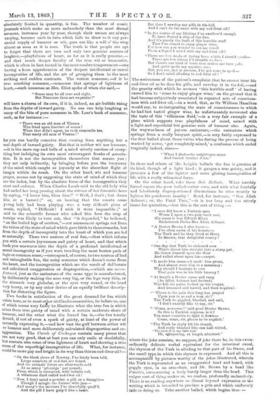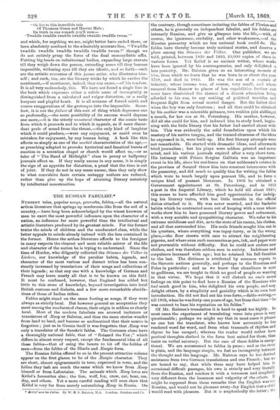But then I envelop my pills in tin-foil, And I can't do the same with my cod-liver oil!
"In the course of my lifetime I've swallow'd enough To have floated a ship of the line, And it's purely the fault of this horrible stuff That I've ceased to enjoy ginger wine. For how can you wonder to see ma recoil From a liquor I mix'd with my cod-liver oil?
"There are few deeds of daring from w'aich I should quail— There are few things I'd tremble to do—
But there's one kind of tonic that makes me turn pale, And quite spoils my appetite, too ; But, you see. juit at present, I've got none to spoil& I don't mind alluding to cod-liver oil ! "
The seriousness of the patieut's complaint that he cannot treat his cod-liver oil as he does his pills, and envelop it in tin-foil,--and the gravity with which he accuses this horrible stuff' of having caused him to cease to enjoy ginger wine,' on the ground that it had become subjectively associated in repeated acts of consciousness with cod-liver oil,—in a word, that, as Sir William Hamilton would say, in re-integrating the state of consciousness in which he had last tasted ginger wine, he unfortunately recovered also the taste of this villainous fluid,'—is a very fair example of a piece which suggests true playfulness of mind, mixed with a light and superficial but genuine vein of humour also. Again, the waywardness of joyous caricature,—the caricature which springs from a really buoyant spirit,—is very fairly expressed in the first ballad about those twins who during the process of being washed by nurse, got completely mixed,' a confusion which ended tragically indeed, since " When I died—the neighbours came And buried brother John."
In these and others of Mr. Leigh's ballads the fun is genuine of its kind, though of a light kind ; it gauges a true gaiety, and it presents a few of the lighter and more glaring incongruities of life with a really whimsical force.
On the other hand, take these Bab &Wadi. What terribly forced capers the poor ballad-writer cuts, and with what fearfully and laboriously disproportioned illustrations he tries wearily to lighten his ponderous inanity ! Read, for instance, "Ben Allah Achmet ; or, the Fatal Tum,"—it is too long and too utterly inane for quotation,—but this is the sort of thing :— " I once did know a Turkish man Whom I upon a two-pair-back met, His name it was Effendi Khan
Backsheesh Pasha Bon Allah Achmet.
"A Doctor Brown I also know— I've often oaten of his bounty— The Turk and he they lived at H000, In Sussex, that delightful county !
"Ono day that Turk ho sickened sore Which throw him straight into a sharp pet, He throw himself upon the floor And rolled about upon his—carpet.
"It made him moan—it made him groan, And almost wore him to a mummey: Why should I hesitate to own
That pain was in his little tummy ?
"At length a Doctor came and rung (As Allah Achmet had desired) Who felt his pulse, looked up his tongue, And hummed and hawed, and then inquired : Whore is the pain that long has preyed Upon you in so sad a way, sir?'
The Turk he giggled, blushed, and said,
• I don't exactly like to say, sir.'
" 'Come, nonsense ! ' said good Doctor Brown, So this is Turkish coyness, is it? You must contrive to fight it down— Como, come, sir, please to be explicit.'
"The Turk he shyly bit his thumb, And coyly blushed like one half-witted, 'The pain is in my little tam' He, whispering, at length admitted."
where the joke consists, we suppose, if joke there be, in this extraordinarily delicate verbal equivalent for the intestinal canal, the shyness of the Turk in alluding to that part of his frame, and the small type in which this shyness is expressed. And all this is accompanied by pictures worthy of the jokes illustrated, wherein the Turk is represented as an exaggerated head and beard, with goggle eyes, in an arm-chair, and Dr. Brown by a head like Punch's, surmounting a body barely larger than the head. This vulgar sort of thing makes us, we confess, profoundly melancholy. There is no reading anywhere so dismal beyond expression as the writing which is intended to produce a grin and which uniformly fails in doing so. Take another ballad, which begins thus :— "Oh list to this incredible tale
Of Thomson Green and Harriet Hale ; Its truth in one remark you'll sum ' Twaddle twaddle twaddle twaddle twaddle twaddle twum."
and which, for anything we see, might better have ended there, or been absolutely confined to the admirably accurate line, "Twaddle twaddle twaddle twaddle twaddle twaddle twinn l" though we do not entirely grasp the force of the final monosyllabic affix. Putting big heads on infinitesimal bodies, expanding large cravats till they weigh down the person, extending noses till they become impossible, widening eyes till they are idiotic, and so forth—such are the artistic resources of this jocose artist, who illustrates himself; and such, too, are the literary tricks by which he excites the merriment,—if merriment, indeed, they can cause,—of his readers.
It is all very melancholy, this. We have not found a single line in the book which expresses either a subtle sense of incongruity as distinguished from a calculated and vulgar distortion, or a really buoyant and playful heart. It is all screams of forced mirth and coarse exaggerations of the grotesque into the impossible. Some
how, it is not the failure of this sort of thing which depresses one so profoundly,—the mere possibility of its success would depress one more,—it is the utterly unnatural character of the comic taste from which it proceeds and to which it appeals, as if mere discor dant peals of sound from the throat,—the only kind of laughter which it could produce,—were any enjoyment, or could even be mistaken for enjoyment, by any human being. A book like this affects us simply as one of the morbid characteristics of the age,— as preaching adapted to provoke hysterical and fanatical bursts of emotion in a sensation chapel or church would affect us,—or as tales of "The Band of Midnight" class in penny or halfpenny journals affect us. If they really amuse in any sense, it is simply
the sign of an appetite for distortion, a proof that the time is out of joint. If they do not in any sense amuse, then they only show to what convulsive feats certain unhappy authors are reduced, rather than give up the hope of attaining literary notoriety by intellectual monstrosities.



































 Previous page
Previous page